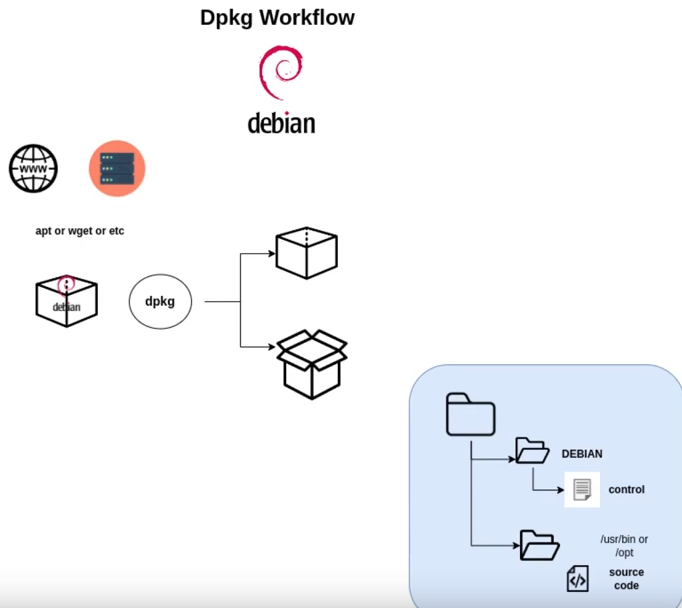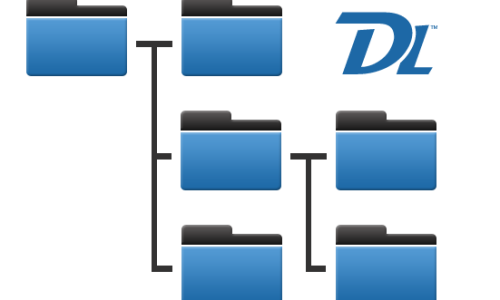DPKG
What is dpkg
dpkg is the core package management tool for Debian-based Linux distributions, such as Debian itself, Ubuntu, and others. It is responsible for installing, removing, and providing information about .deb packages, which are the standard package format used in these systems. While dpkg can handle individual packages directly, it does not manage dependencies or resolve package conflicts. For instance, if you attempt to install a .deb package that requires other packages to function, dpkg will not automatically fetch or install those dependencies.
One of the key features of dpkg is its ability to manage local package installations. You can use dpkg to install packages that are downloaded directly from sources outside the official repositories, like from a file or a third-party vendor. It offers several subcommands, such as dpkg -i for installing a package, dpkg -r for removing a package, and dpkg -l for listing installed packages. This makes dpkg useful for situations where you don’t have access to an online repository or when you need fine-grained control over specific package installations.
However, dpkg is a low-level tool, and it does not handle higher-level tasks like dependency resolution or package updates. For these functions, users typically rely on tools like apt or apt-get. These tools work with repositories, automatically resolving dependencies, handling package versions, and installing any missing libraries or packages. While dpkg can install a .deb file, it’s often used in conjunction with apt to ensure that the system remains properly configured and that all necessary dependencies are installed.
Note that dpkg is used to install individually packages. The main drawback of using dpkg is missing dependencies handling


How to install dpkg
Comes pre-installed with a debian base installation.
Folder/files structure and configuration

1. /var/lib/dpkg/
- Purpose: This is the main directory where
dpkgkeeps its database and configuration files. - Common Subdirectories/Files:
/var/lib/dpkg/status: The status file wheredpkgkeeps track of the installed packages and their state (installed, removed, etc.)./var/lib/dpkg/info/: Contains package-specific metadata like control files, installation scripts, and files for each installed package (e.g.,vlc.md5sums,vlc.list).
2. /var/cache/apt/
- Purpose: While not directly related to
dpkg, this directory is where APT (Advanced Package Tool) caches downloaded package files, which can be used later bydpkgfor installation. - Common Subdirectories:
/var/cache/apt/archives/: This folder contains downloaded.debpackage files that APT uses for installation (if you install a package withapt)./var/cache/apt/archives/partial/: Temporary storage for partially downloaded packages.
3. /usr/share/doc/
- Purpose: Contains documentation files for installed packages. These are generally placed here by
dpkgwhen packages are installed. - Common Subdirectories:
/usr/share/doc/<package_name>/: Documentation folder for each package, containing README files, changelogs, and licensing information./usr/share/doc/package_name/changelog.Debian.gz: Changelog for Debian packages.
4. /etc/
- Purpose: Configuration files for installed packages are typically placed here by
dpkg. - Common Subdirectories:
/etc/apt/: APT configuration files likesources.list(repository sources),preferences, etc./etc/dpkg/: Configuration files fordpkg(e.g.,dpkg.cfg).
5. /usr/bin/ and /usr/sbin/
- Purpose: These directories are where executables (binaries) for most installed packages are stored.
- Common Files:
/usr/bin/: Binaries for user-level commands./usr/sbin/: System-level binaries that require superuser privileges.
6. /var/log/apt/
- Purpose: Contains log files for APT operations, which can provide details on installed or removed packages.
- Common Files:
/var/log/apt/history.log: Logs installation and removal history of packages via APT./var/log/apt/term.log: Logs terminal output of APT commands.
7. /var/lib/dpkg/updates/
- Purpose: Stores updates for installed packages, which
dpkguses during upgrades. - Common Files:
- Temporary files used by
dpkgduring package upgrades, such as partial package updates.
- Temporary files used by
8. /tmp/
- Purpose: Temporary space used by
dpkgand other package managers for temporary files during package installation or upgrades. - Common Files:
- Temporary files generated during installations, such as unpacked files or installation logs.
9. /etc/alternatives/ (Related to alternatives system)
- Purpose: This directory holds symbolic links that manage alternatives (e.g., different versions of
javaorpython). - Usage: Tools like
update-alternativesuse this directory to create symbolic links for various executables, often when multiple versions of a program are installed.
Termomonlogy and Concept
-
.deb Package- The Debian package format, used to distribute software and system components in Debian-based systems. A
.debfile contains the compiled software, configuration files, and metadata needed for installation.
- The Debian package format, used to distribute software and system components in Debian-based systems. A
Package- A collection of files and metadata bundled together in a
.debfile. It includes the program, its libraries, and documentation, as well as installation scripts and configuration files.
- A collection of files and metadata bundled together in a
Installation- The process of unpacking and placing the files from a
.debpackage onto the system.dpkg -iis the command used to install a package.
- The process of unpacking and placing the files from a
Removal- The process of uninstalling a package.
dpkg -rremoves the package from the system but typically leaves configuration files behind.dpkg -Premoves the package and its configuration files.
- The process of uninstalling a package.
Package Dependencies- Packages that are required by another package to function correctly.
dpkgdoes not handle dependencies automatically, so they must be resolved either manually or with a higher-level tool likeapt.
- Packages that are required by another package to function correctly.
Package Database- A database maintained by
dpkgthat stores information about all installed packages on the system, such as version, installation status, and file locations.
- A database maintained by
Control Files- Metadata files within a
.debpackage that describe the package’s content, dependencies, description, version, and installation instructions. This includes files likecontrol,postinst,preinst, etc.
- Metadata files within a
Status File- A file (typically
/var/lib/dpkg/status) wheredpkgkeeps track of installed, partially installed, or removed packages and their associated metadata.
- A file (typically
Package List- A list of all installed packages on the system. You can view it using
dpkg -l, which shows the status, name, and version of each installed package.
- A list of all installed packages on the system. You can view it using
Querying- The process of retrieving information about a package. For example,
dpkg -s <package>shows the status and metadata of a package, anddpkg -L <package>lists the files installed by the package.
- The process of retrieving information about a package. For example,
Unpacking- The extraction of files from a
.debpackage archive.dpkgunpacks the contents into the appropriate system directories during installation
- The extraction of files from a
Trigger- A mechanism used by
dpkgto perform actions after certain package events, such as installing or removing packages. Triggers allow packages to notify the system about changes (e.g.,dpkg --configure).
- A mechanism used by
Post-installation/Pre-installation Scripts- Scripts included in the
.debpackage that run automatically during the installation or removal process. These are often used to set up or configure the package after it’s installed.
- Scripts included in the
Reconfiguration- The process of re-running configuration scripts for a package without reinstalling it. This can be done using the
dpkg-reconfigurecommand.
- The process of re-running configuration scripts for a package without reinstalling it. This can be done using the
Broken Package- A package that cannot be installed or has missing dependencies. If a package installation fails due to unmet dependencies, it may leave the system in a “broken” state, which
dpkg -Ccan help identify.
- A package that cannot be installed or has missing dependencies. If a package installation fails due to unmet dependencies, it may leave the system in a “broken” state, which
Debconf- A configuration management system used by Debian packages to prompt users for input during package installation. This system is used alongside
dpkgto interactively configure software.
- A configuration management system used by Debian packages to prompt users for input during package installation. This system is used alongside
Package Integrity- Ensuring that a package is not corrupted during installation.
dpkgchecks package integrity and can refuse to install a package if it is broken or corrupted.
- Ensuring that a package is not corrupted during installation.
Locked State- A state that prevents
dpkgfrom running if another instance ofdpkgis already running, which helps avoid conflicts in package management.
- A state that prevents
Virtual Package- A package that doesn’t contain any files itself but acts as a placeholder for other packages providing similar functionality. These are often used for alternatives (e.g.,
mail-transport-agent).
- A package that doesn’t contain any files itself but acts as a placeholder for other packages providing similar functionality. These are often used for alternatives (e.g.,
Local Repository- A directory of
.debpackages that you can manage and install from, usingdpkgto install individual packages directly without needing an internet connection.
- A directory of
How to use dpkg
Installing packages
When installing packages with dkgp its important to understand that dpkg handles .deb files and NOT repositories. These are usually obtained through a website
sudo dpkg -i negtbeans-all.deb
Remove packages
Remove the package vlc but keep the configuration files
sudo dpkg -r vlc
Remove the package vlc AND configuration files
sudo dpkg -P vlc
List all files installed by vlc
dpkg -L vlc
List the content of a .deb file
All contents of negtbeans-all.deb without installing it!
sudo dpkg -c negtbeans-all.deb
List all packages
sudo dpkg --list
Extract content of packages
Extract content of package negtbeans-all.deb without actually installing it or configuring it
sudo dpkg --unpack negtbeans-all.deb
List info of a package
For the package vlc
sudo dpkg -s vlc
Note:This output display similar data as apt show vlc.
This command query the underlying package database at
/var/lib/dpkg/status
. apt does also provide additional data pulled from repositories
Help menu
dpkg --help

